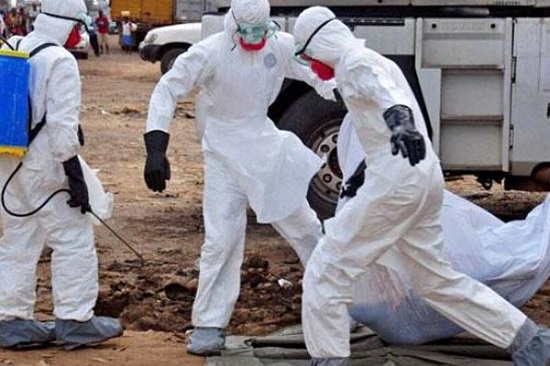The outbreak of the deadly hemorrhagic fever has already killed 139 people in the Democratic Republic of Congo.
The World Health Organization on Wednesday decided not to declare the ongoing Ebola outbreak in the war-torn northeastern region of the Democratic Republic of Congo an international health emergency.
This Ebola outbreak, the seventh largest in history, with 216 cases and 139 dead since July, has seen a sharp uptick in cases in the last few days after response efforts were limited by rebel violence, political instability and community resistance. The WHO’s emergency response chief, Peter Salama, previously told HuffPost that this has been the “most difficult context” for dealing with an Ebola outbreak ― ever.
The WHO’s emergency committee decided that the outbreak was very concerning for the region, but not of wider international concern, committee Chairman Dr. Robert Steffen said Wednesday in Geneva. While the WHO currently deems the risk of wider international spread as low, it says the risk of its spreading nationally and regionally is very high. The committee also did not want a potential emergency declaration to impact travel and trade, which they believe would hinder the emergency response.
“We do have some optimism that this outbreak, just like the one in May, will be brought under control in a reasonable amount of time,” Steffen said.
A WHO declaration of a so-called public health emergency of international concern (PHEIC) would have aimed to draw the world’s attention and hopefully elicit a greater international response to a health crisis with global implications. Since 2007, when the barometer was established, the WHO has only declared a PHEIC four times: for swine flu in 2009, polio and Ebola in 2014, and Zika in 2016.
The WHO also decided not to declare a PHEIC over the last Ebola outbreak, which ultimately killed 33 people in the DRC’s Équateur province earlier this year, due to the quick response and deployment of an experimental vaccine. However, that outbreak was not taking place in a war zone.
“The [declaration of a PHEIC would have] snapped people into attention that otherwise have not been noticing the rising challenges in DRC around Ebola,” Dr. Thomas Inglesby, director of the Johns Hopkins Center for Health Security, told HuffPost.
Last week, the WHO said it was $25 million short of the $33 million it says it needs to stamp out this outbreak by January ― costs that have gone up with the increased security needs and wide geographic spread of the disease. On Wednesday however, WHO Director Tedros Adhanom Ghebreyesus said international partners have been generous, and he believes the lack of a PHEIC declaration will not affect their commitments.
But when it comes to the U.S., Inglesby wonders if it would have motivated the country to become more involved.
“That kind of announcement at the highest level would [have been] a catalyst for contributing more technical expertise and leadership from the U.S. side,” Inglesby said.
Inglesby has been pushing for more involvement from the Centers for Disease Control and Prevention, as HuffPost first reported last week, since the CDC does not currently have any team members in the epicenter of Beni. A CDC spokeswoman said there is currently an Ebola expert adviser, vaccine expert, and border health expert in the capital of Kinshasa, as well as personnel deployed to the border country of Uganda, where there is high risk of cross-country spread due to the mobile populations there.
“In terms of people in the field, the U.S. isn’t participating in ways it has in the past,” Inglesby said, citing security concerns. “There’s also a risk in not participating and not contributing what CDC leaders have been able to contribute.”
When asked about the lack of a CDC presence in Beni, the WHO’s Tedros said that “the U.S. security guidelines are stricter.”
“That’s why they have pulled out,” he said. “But we believe we can have experts from other institutions that can cover if there is any gap.”
On the ground, the WHO is stressing that despite the rising number of community deaths ― people who have died in their homes, outside of Ebola treatment centers, as they were not known to health authorities ― it has seen an uptick in cases in part because of the improved tracing of contacts.
And there has been a lull since Sunday in both rebel violence and political protests, which has enabled emergency health workers more access, said Nora Love, the Beni-based emergency field coordinator for the International Rescue Committee. That is a game-changer in contact-tracing and response, Love said.
“If we’re not have any security issues, it goes a long way,” she said, stressing that continued access for the response would help drive down the rising number of cases.
Inglesby cautioned that much is still unknown about the future of this outbreak, and pointed to the 2014 West Africa outbreak, which killed over 11,300 people and infected 28,600 more in Guinea, Liberia and Sierra Leone.
“That outbreak trended down to single-digit cases at one point before re-emerging and engulfing those three countries for the months to follow,” he said. “As long as there’s transmission we haven’t been able to track through contact tracing, it’s very dangerous,” he told HuffPost, pointing to the worrying trends last week that over 70 percent of the cases found were not known contacts.
“I think it still is teetering right on the edge.”
[HuffPost]



